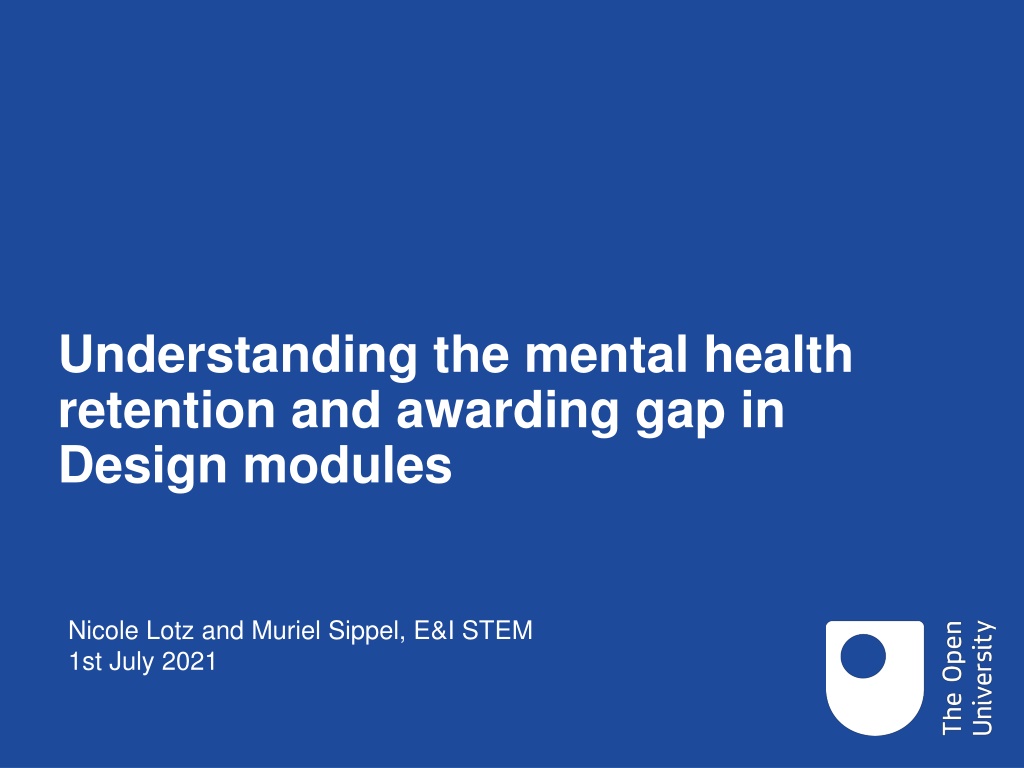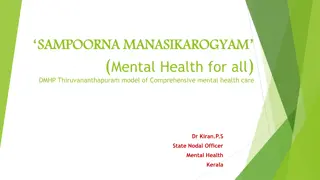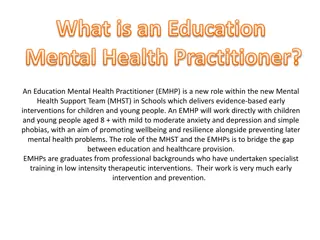Understanding the Mental Health Retention Gap in Design Modules
Addressing the retention and awarding gap in Design modules for students with mental health difficulties is crucial. Factors affecting retention include personal circumstances, support received, and uncertainty in providing appropriate assistance. The project aims to gain insights, develop recommendations, and create targeted interventions to support these students effectively. The approach involves qualitative, longitudinal interviews with a diverse group of students. Recruitment challenges and the need for individualized support are also highlighted.
Download Presentation

Please find below an Image/Link to download the presentation.
The content on the website is provided AS IS for your information and personal use only. It may not be sold, licensed, or shared on other websites without obtaining consent from the author. Download presentation by click this link. If you encounter any issues during the download, it is possible that the publisher has removed the file from their server.
E N D
Presentation Transcript
Understanding the mental health retention and awarding gap in Design modules Nicole Lotz and Muriel Sippel, E&I STEM 1st July 2021
Background Consistently low and variable pass rates and variable attainment between presentations of modules across Design for students with Mental Health difficulties Intersecting factors that impact on mental health students retention and attainment in the Design modules: U101, T217 and T317 Discipline (knowledge and skills, coursework, assessment), Personal circumstances (work and family, caring commitments, life events), Support received during their studies from OU and elsewhere Uncertainty of how best to support individual cases Not only adjustment during presentation, but taking diverse experiences of students into account during module production and learning design 2
Aims and Objectives Aims 1. Gain a deeper understanding of the specific issues experienced by Design students with mental health disabilities throughout their study. 2. Develop recommendations that could inform the learning design of modules in production and positive interventions in presentation to reduce the awarding gap and facilitate progression in D&I. Objectives Understand cross-sectional aspects of the study experience of design students with mental health disability Disseminate insights and recommendations to Design module teams and qualification team to inform targeted inclusive design interventions in production and presentation Inform the development of discipline specific student support guidelines for Design tutors (in collaboration with Design Disability Champion network) Develop a methodology that could be employed more widely to understand experiences of other disadvantaged groups at the OU (other disability, ethnic background, low socio- economic background) 3
Approach Qualitative, in-depth, longitudinal over 4-5 months AL recruitment - 4 passionate interviewers Each interviewer works with 2 students from one module 20J: U101, T217, T317, 21B: U101 Aim to build a conversational, trusting relationship, but not as a tutor, more like a friend with a good listening ear! Student selection: aim for diversity Prev. high and low achieving Mix of gender and background (e.g. age, ethnicity) Low sample size at higher levels challenging 5
Recruitment Student recruitment 7 out of 8 recruited Interviewers get diverse reactions from students Immediate individual support sought Voucher rather than Smartphone Want to help (excitement even) but also need help Students feeling overwhelmed Audio recorded rather than signed consent 6
Interviews: beginning and end Interview 1 30 question Interview audio recorded Interview 2 50 question interview audio recorded Prep well and accommodate individual: Trigger words or phrases or painful memories or topics to avoid. Agree tool for interview and format (video or audio only) Inform we don't know what they have declared, e.g. what mental health disability Ask for emergency contact number from the student or their advocate's contact information Offer splitting interview sessions 7
Experience Sample and Diary Experience sample First and second prompts during the day (in the moment experience) Are you studying at the moment? Yes What are you studying? How do you feel about what you are studying? What do you think about what you are studying? Scheduled prompts to mobile phone 3 times a day over a week split into 2 in the moment experiences and a reflective end of day recording Or Are you studying at the moment? No What are you doing at the moment? How do you feel at the moment? What are you thinking about at the moment? Third end of day prompts What studyrelated work or other activity have you been doing today? What aspects have you been struggling withmost today? What (or who) helped you most today? Would you have liked any additional support today? Diary One message thread a day over 10 days (expecting that participant does not work on TMA every day) Have you been working on your TMA today? Aim at collecting 7 entries over 10 days, describing how they have progressed their TMA project work. If participants reply with yes then prompt: Describe and show us what you have done. Has anything noteworthy happened? What was it? When did it happen? How did you feel about it? What questions did you have and could not answer? 8
Case 1: Ben Level 1 student, male, 30 s. Many attempts at brick and mortar uni Obsessive Compulsive Disorder (OCD Post-Traumatic Stress Disorder (PTSD) Generalised Anxiety Disorder (GAD) Emotional Dysregulation (ED)
Case 1 OUstudy good practice Background OU study struggles Long term mental health Surprisingly perfect choice Ideation might trigger anxiety PTSD, OCD, Anxiety fear of public crowded places, illness etc Obsessive loops prevent moving on it s a proper degree! Sunday plan weekly study No immediate clarification of tasks Bad sleep worsened anxiety Colour coded day dictates routine, green - getting ahead of plan Putting off tasks and then falling ill Variable daily rhythms needed COVID delay to DSA (mentor, software, equipment) Rather homebound Course/pace fluidity is appreciated Not many friends Keeping to recommended study times helps with getting out of OCD loops, helps with studying flexibly due to exhaustion Wasn t aware of MH help from OU, but OU helped DSA application Powerless in low phase COVID End of pandemic scary less digital, might be missing out Creative person, Poetry, DIY, Hacking and designing online games, Photography makes me happy ODS pace keeper, confidence giver COVID Module material /assessment adaptation needed in places but tutor can t help to adapt (new tutor) anxiety inducing Creates designs that focus on the under supported (fashion for visually impaired) Asking for support is hard (initial step and when you are low) WhatsApp group for module (main and tutor group - visual and textual, brainstorm, close bound developed, fundamental to progress, fear of losing it when moving to different module, works only when doing the same work) Small errors in material trigger anxiety DSA assessor conversation helpful but drawback that it is scheduled, support in the moment missing, just 50% help Module software limitations to show work done depression inducing - fairness Knowing which activities could be done in advance would be helpful Financial struggles due to not being able to work but not on benefits because of study Less fees paid less service received Include family in study (partner MH social work professional helpful) Distance learning PT 2000 compared to brick Uni FT 14000 10
Case 2: 'Anna' Level 3 student, female, 30s. LGBTQ learner, full time carer for partner, voluntary work Bipolar Postural tachycardia syndrome (PoTS) Anxiety
Case 2 Background OU study good practice OU study struggles LGBTQ learner Use L1 modules to work out study skills and mindset, ready for L 2 Overthinking, not getting quick reply to question can make more anxious Long term disabilities With Bipolar, some days are not good for studying, so stop, rest, wait for a better day to focus and push through a unit or an assignment. Anxious with meeting others not being in known place Bipolar (diagnosed 2017) -anxious, doesn t like noise, likes to know where she is, who she is with, struggles with meeting new people, going to new places. Anxious about Forums, ODS, like to remain more anonymous. "my work isn't good enough", then worried not doing good enough with studies. Make sure you have an advocate set up for those times that you can't cope. Postural tachycardia syndrome (PoTS) more recent diagnosis Distance learning works well but miss not being able to read body language The disability mentor very supportive throughout studies meet like friends, but not a subject specialist Full time carer for partner Do want a specialist answer, student support services are less helpful with study skills or specialist information Voluntary work as web page designer for charity (likes creative side), helps to keep Anna in the loop for career skills when she returns to work Set up a study space, in that space you know it is your study time, then give yourself a break from that space. Extensions are helpful but not always confident to ask for them, some tutors are more understanding than others Excellent school exam results, parents separated, took wrong pathway at college (not maths), lost best friend to cancer, struggled with timetable. Family and partner are supportive as know how best to support when things are more difficult. Module materials can be inconsistent in how things are explained or how you need to do something for an activity or assignment. With a summer school, someone can go with you, can make a huge difference. OU gives Anna "an opportunity" for a degree which would be difficult with her health, anxiety and role as carer Design assignments questions work togther, feed into each other which can be hard if unsure of way working whereas, in math modules questions quite separate, so one answer less likely to affect other marks. Creative thinking can help your well- being as "quietens your mind". Enjoys Maths, studying Engineering, level 3 Design module, using different skills, achieved best results so far. Design modules are more social asking for feedback about ideas from family 12
Reflections as an interviewer A privilege to work with Anna and to be welcomed into a window of her life Moving answers at times, hard not to respond to, emails to colleagues did help. De-briefs after each stage of the process helped to overcome some of the limitations as an interviewer, helped to build more of an understanding between the two different roles No trigger words for Anna, as used to being an "open book" when talking to therapists or professionals but was reassured by being asked about trigger words Preferred to talk over the phone for interviews so could wander around while talking PoTs There is a need to be flexible with your approach for timings of interviews and recordings for the in the moment responses and the diary messages. Using What's App for the messages worked well as students are comfortable with using it, questions worked well as prompts, helped with reflections, an interesting insight at times To summarise the final de-brief, one student commented about working with the interviews, the diary and the in the moment responses by saying "I enjoyed it more than going to therapy and I know myself better now." 13
Reflecting on and informing my own practice as an AL Understanding that it is important to respond to emails as soon as you can Encourage D-flag students to contact you and reassure them that it is okay to ask for help Referring a student is not always the right approach, students do value specialist support from their module tutor Appreciating that D flag students often prefer email or text for communicating with staff, some are reluctant to use the phone or Forums Technical language and module jargon can be difficult to interpret even for level 3 students, it does help to explain things more clearly and in steps can take several emails. D-flag students do worry and can over think things so an email to say your assignment is looking good, especially if there are delays in returning marks, can make a difference reduce anxiety, stop sleepless nights Supporting D flag students does take more time and empathy, but I have found that it is time that is worth giving, for the benefit of the student's well-being and for my own personal well-being. The insights gained from the data collection will help to inform my practitioner research about creative thinking, distance design education and mental well-being. 14
Where Next De-brief of overall process and perceptions with Interviewers Discourse analysis of data from all students using NVivo looking forward to seeing the whole picture and the outcomes Comparisons made to literature review using NVivo In-depth analysis of findings, exploring and understanding outcomes Work together as a team to review outcomes and suggestions for AL development and provision of support for students with their mental well being whilst studying Share findings with curriculum design team for new BDes Consider wider training in workshops with ALs in Design modules and interviewees where possible Share good practice to the wider network in E&I and STEMA 15
Conclusions Supporting interviewers to cope Overthinking a nd anxiety make study difficult, time and support can limit these Specialist subject support is valued Keeping methodology flexible Issues multi- dimensional, MH + trigger in tasks + no immediate support 16























